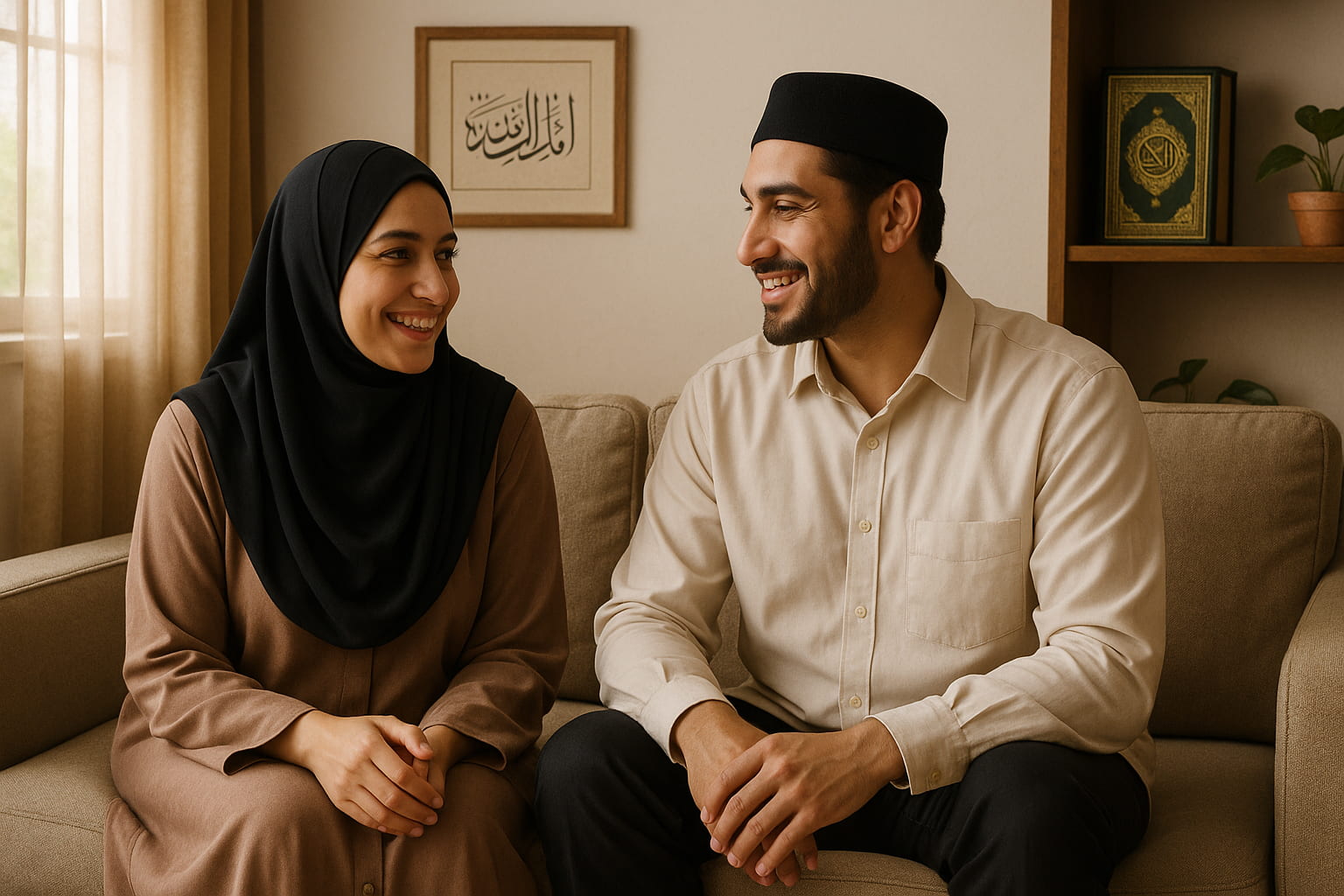Maintaining respectful boundaries and learning how to effectively communicate with ex-spouse is not only important for emotional healing but also strongly supported in Islamic teachings. Whether for co-parenting, resolving past matters, or handling shared responsibilities, Islam provides guidance on how to uphold dignity, justice, and respect in such interactions.
Importance of Respectful Communication After Divorce
Divorce in Islam is permissible but disliked by Allah. It is a serious matter that should be dealt with maturity and respect. When it becomes necessary to communicate with ex-spouse, one must follow Islamic etiquette—preserving honor and avoiding backbiting, anger, or slander.
Divorce is Not the End of All Interaction
- If children are involved, communication remains essential.
- Even without children, some logistical or financial matters may require dialogue.
- Islam encourages fairness and decency in post-marital dealings.
Qur’anic Guidance on Post-Divorce Behavior
The Qur’an offers profound wisdom on how Muslims should conduct themselves after divorce. These verses emphasize justice, kindness, and maintaining boundaries.
1. Surah Al-Baqarah (2:231)
وَإِذَا طَلَّقْتُمُ النِّسَاءَ فَبَلَغْنَ أَجَلَهُنَّ فَأَمْسِكُوهُنَّ بِمَعْرُوفٍ أَوْ سَرِّحُوهُنَّ بِمَعْرُوفٍ
“And when you divorce women and they have fulfilled their term, either retain them in a fair manner or release them in a fair manner.”
This verse reminds Muslims to communicate with ex-spouse in a fair and respectful way, especially at the conclusion of ‘iddah.
2. Surah At-Talaq (65:2)
فَإِذَا بَلَغْنَ أَجَلَهُنَّ فَأَمْسِكُوهُنَّ بِمَعْرُوفٍ أَوْ فَارِقُوهُنَّ بِمَعْرُوفٍ
“Then when they have fulfilled their term, either keep them according to acceptable terms or part with them according to acceptable terms.”
Clear communication is vital, and Allah emphasizes the need for ma‘ruf (acceptable/good) treatment even after separation.
3. Surah Al-Baqarah (2:237)
فَإِن طَلَّقْتُمُوهُنَّ مِن قَبْلِ أَن تَمَسُّوهُنَّ وَقَدْ فَرَضْتُمْ لَهُنَّ فَرِيضَةً فَنِصْفُ مَا فَرَضْتُمْ
“If you divorce them before you have touched them, but have already specified a dower for them, then give half of what you specified.”
This verse instructs on just financial settlement—an area that often requires one to communicate with ex-spouse clearly and honorably.
4. Surah Al-Talaq (65:6)
وَإِن كُنَّ أُو۟لَـٰتِ حَمْلٍۢ فَأَنفِقُواْ عَلَيْهِنَّ حَتَّىٰ يَضَعْنَ حَمْلَهُنَّ
“And if they are pregnant, spend on them until they give birth.”
Islamic communication includes financial responsibility, especially in cases involving children or pregnancy.
5. Surah Al-Baqarah (2:233)
لَا تُضَآرَّ وَٰلِدَةٌۭ بِوَلَدِهَا وَلَا مَوْلُودٌۭ لَّهُۥ بِوَلَدِهِۦ
“No mother shall be harmed through her child, and no father through his child.”
This highlights the need for mutual understanding and cooperation when you communicate with ex-spouse about parenting.
Hadiths on Maintaining Dignity After Divorce
The Prophet Muhammad ﷺ demonstrated the highest level of character, even in personal matters. He dealt with his wives with justice and respect, setting an example for all Muslims.
Respect and Kindness Even After Separation
Narrated by Aisha (RA):
“The Prophet ﷺ never hit anything with his hand, neither a woman nor a servant…”
[Sahih Muslim]
This indicates that respect and non-violence are essential in all relationships—even after they end.
Reviving Justice in Separation
The Prophet ﷺ said:
“The most detestable of permissible things to Allah is divorce.”
[Abu Dawood, 2178]
While divorce is allowed, the Prophet ﷺ disliked it, indicating that if it must happen, it should be conducted with full respect and justice.
Islamic Etiquette When You Communicate with Ex-Spouse
When attempting to communicate with ex-spouse, the following etiquettes must be kept in mind:
1. Avoid Harsh Language
- Always speak gently and avoid blame.
- Do not raise past issues unless necessary.
2. Respect Their Boundaries
- Keep communication limited to important matters.
- Avoid casual chatting unless remarriage is an option and both parties consent.
3. Do Not Backbite or Complain to Others
- Allah forbids backbiting (Surah Al-Hujurat 49:12).
- Speak to your ex-spouse directly, not behind their back.
4. Keep Emotions Under Control
- Seek Allah’s help before sensitive conversations.
- Make du‘a for wisdom and patience.
Co-Parenting: A Major Reason to Communicate with Ex-Spouse
When children are involved, Islamic guidance becomes even more crucial.
Responsibilities of Both Parents
- Fathers must financially support the children.
- Mothers are often given primary custody, but both must collaborate.
- Children’s well-being should always be prioritized.
Positive Co-Parenting Tips
- Agree on a communication schedule.
- Avoid arguments in front of the children.
- Make mutual decisions on major issues.
- Never use children as messengers.
When Not to Communicate with Ex-Spouse
There are times when no communication is better for both parties:
- If interactions are abusive or harmful.
- If one party has remarried and communication causes fitnah.
- If legal or shariah rulings require complete separation.
Making Du‘a and Seeking Guidance from Allah
Whenever you feel confused or hurt while trying to communicate with ex-spouse, turn to Allah in prayer.
Recommended Du‘as for Wisdom and Patience
رَّبِّ اشْرَحْ لِي صَدْرِي – وَيَسِّرْ لِي أَمْرِي
“My Lord, expand for me my breast [with assurance]; and ease for me my task.”
[Surah Taha 20:25-26]
اللَّهُمَّ اهْدِنِي وَسَدِّدْنِي
“O Allah, guide me and keep me steadfast.”
[Sahih Muslim]
Role of Islamic Counseling in Healthy Communication
If emotions are too intense, seek help from:
- An Imam or qualified counselor
- Trusted family elders
- Islamic mediation centers
This can ease misunderstandings and prevent unnecessary conflicts when you must communicate with ex-spouse.
Emotional Healing: Islam Encourages Letting Go with Grace
In Islam, emotional wellness and mental peace are part of a believer’s well-being. After a divorce, both partners are encouraged to move on with sabr (patience), dignity, and tawakkul (trust in Allah). When you need to communicate with ex-spouse, it must not reopen emotional wounds or disrupt healing.
Practice Forgiveness
Even if the marriage ended on bad terms, Islam urges us to forgive:
وَلْيَعْفُوا وَلْيَصْفَحُوا ۗ أَلَا تُحِبُّونَ أَن يَغْفِرَ اللَّهُ لَكُمْ
“Let them pardon and overlook. Would you not love for Allah to forgive you?”
[Surah An-Nur 24:22]
Forgiveness helps clear the heart and makes it easier to communicate calmly and justly.
Avoid Repeating Mistakes
When you communicate with ex-spouse, learn from the past and don’t repeat hurtful behaviors. If something caused pain during marriage, avoid revisiting it unless it’s necessary for resolution.
Setting Healthy Boundaries According to Shariah
Islam emphasizes the value of hudood (boundaries). After a divorce, these boundaries become even more essential to protect both individuals from fitnah and unnecessary emotional involvement.
Maintain Professional Tone
- Treat all interactions as professional, similar to dealing with a business partner.
- Avoid flirtatious talk or emotional dependency.
Observe Modesty and Non-Khalwah
Islam does not allow unnecessary seclusion or inappropriate interactions with the opposite gender. Even though your ex was once your spouse, after divorce, Islamic rulings apply like any other non-mahram person.
“A man is not alone with a woman but the third of them is Shaytaan.”
[Tirmidhi 2165]
This hadith warns against casual or private meetings. Keep interactions public or through text/audio where others are aware.
Handling Legal and Financial Matters with Ex-Spouse
Sometimes, you are required to communicate with ex-spouse due to:
- Mahr (dower) or unpaid financial dues
- Mutual property
- Child custody or expenses
Islam strongly emphasizes the fulfillment of rights and contracts.
Qur’anic Reminder:
يَـٰٓأَيُّهَا ٱلَّذِينَ ءَامَنُوا۟ أَوْفُوا۟ بِٱلْعُقُودِ
“O you who believe, fulfill your contracts.”
[Surah Al-Ma’idah 5:1]
In such situations:
- Always keep a written record of communication.
- Use legal channels if necessary to avoid disputes.
- Do not delay or deny rightful dues.
What Scholars Say: Fiqh Perspective on Communicating with Ex-Spouse
Islamic scholars from all schools of thought (Hanafi, Shafi‘i, Maliki, Hanbali) agree that communication with an ex-spouse is permissible only when necessary, and it must be done within Islamic boundaries.
When is Communication Considered Permissible?
- Co-parenting decisions
- Discussing pending mahr
- Clarifying misunderstandings in a respectful way
- Financial and legal settlements
When is Communication Not Permissible?
- Without purpose, just to relive memories
- If it leads to emotional attachment
- If it causes harm to a current spouse or family
- If it opens the door to sin or immodesty
Managing Conflict: Islamic Tips for Difficult Conversations
Not every post-divorce conversation is smooth. Disagreements happen. But Islam provides tools to handle them with wisdom and dignity.
Use of Wise Words
Allah says:
وَقُولُوا لِلنَّاسِ حُسْنًا
“And speak to people good words.”
[Surah Al-Baqarah 2:83]
- Avoid insults or reminders of the past.
- Focus only on the present issue.
- Do not raise your voice.
Be Just Even if You Dislike Them
وَلَا يَجْرِمَنَّكُمْ شَنَـَٔانُ قَوْمٍ عَلَىٰٓ أَلَّا تَعْدِلُوا۟ ۚ ٱعْدِلُوا۟ هُوَ أَقْرَبُ لِلتَّقْوَىٰ
“Do not let the hatred of a people prevent you from being just. Be just; that is nearer to righteousness.”
[Surah Al-Ma’idah 5:8]
No matter how bitter the separation was, justice must guide your words and actions when you communicate with ex-spouse.
Communication and Remarriage: What If You Want to Reconcile?
In some cases, divorced couples may consider reconciliation. Islam does allow remarriage with your ex-spouse, under specific conditions.
Conditions for Remarriage
- If talaq was revocable (1st or 2nd), you may reconcile during the ‘iddah.
- If three talaqs were issued, you cannot remarry unless the woman marries another man and that marriage ends lawfully.
فَإِن طَلَّقَهَا فَلَا تَحِلُّ لَهُۥ مِنۢ بَعْدُ حَتَّىٰ تَنكِحَ زَوْجًۭا غَيْرَهُۥ
“And if he divorces her (a third time), then she is not lawful to him until she marries another husband.”
[Surah Al-Baqarah 2:230]
In such cases, communication must be extremely guarded, and preferably through intermediaries or family members.
Communicate with Ex-Spouse Through Islamic Wisdom: Stories from the Salaf
To better understand how to communicate with ex-spouse, we can reflect on examples from the early generations of Islam. The righteous predecessors (Salaf-us-Salih) often managed post-divorce relations with incredible maturity and piety.
Umar ibn Al-Khattab (RA) and His Advice
It is narrated that Umar ibn Al-Khattab (RA) once advised a man who divorced his wife but kept insulting her afterward. Umar (RA) said:
“What relationship is left between you that gives you the right to mention her in such a way? Either speak well of her, or remain silent.”
This reflects a key Islamic principle: once a marriage ends, your duty is to either speak good or stay quiet. Even if deep hurt remains, you must communicate with ex-spouse without slander or insult.
Encouraging Emotional Maturity in Post-Divorce Communication
Islamic behavior is not just about external actions—it emphasizes inner refinement. If your emotions are still raw, Islam encourages you to work on:
- Self-restraint (Taqwa)
- Silence over emotional outbursts
- Respect over revenge
- Peace over pride
When you approach the need to communicate with ex-spouse, ensure your heart is clean from grudges. This not only helps your mental state, but also earns Allah’s pleasure.
Modern Tools and Technology: Communicate with Ex-Spouse Carefully
In today’s digital world, communication can happen through:
- Text messages
- Email
- Voice notes
- Legal apps or parenting portals
While these tools are helpful, they also carry the risk of misuse. Islam does not prohibit using technology, but it reminds us to use it ethically and responsibly.
Guidelines for Digital Communication:
- Don’t send messages late at night
- Don’t delete or hide conversations
- Keep screenshots for accountability
- Avoid emojis or soft language that may confuse intent
- Use neutral and professional language
When using any tool to communicate with ex-spouse, ask yourself: “Would I be okay if Allah showed this message to the public?”
Dua Before Communicating with Ex-Spouse
Always begin with Du‘a (supplication). Ask Allah to guide your tongue, purify your heart, and protect you from sin.
Example Du‘a:
اللَّهُمَّ إِنِّي أَسْأَلُكَ رِضَاكَ وَالْجَنَّةَ، وَأَعُوذُ بِكَ مِنْ سَخَطِكَ وَالنَّارِ
“O Allah, I ask You for Your pleasure and Paradise, and I seek refuge in You from Your anger and the Fire.”
[Tirmidhi]
And when you’re about to have a tough conversation, say:
اللَّهُمَّ اهْدِ قَلْبِي وَسَدِّدْ لِسَانِي
“O Allah, guide my heart and direct my speech.”
Teaching Children Islamic Etiquette in Co-Parenting
If your communication with your ex-spouse involves co-parenting, remember that your child learns from you. Their behavior, attitude, and even faith can be affected by how you speak about your ex-spouse.
Teach Your Child:
- Respect for both parents
- Not to take sides
- Islamic manners (Adab) in family matters
- How to forgive and be patient
- The value of prayer and Du‘a during family trials
By showing grace when you communicate with ex-spouse, you teach your child the real meaning of Islam in action.
Final Reflection: A Test of Character
Allah may have written divorce in your destiny, but how you behave after the divorce is your test. When you communicate with ex-spouse, you are either:
- Adding to your book of sins,
- Or collecting rewards for patience, justice, and dignity.
Always remember:
إِنَّمَا الْأَعْمَالُ بِالنِّيَّاتِ
“Actions are but by intentions.”
[Bukhari & Muslim]
If your intention is sincere—for peace, for children, or to uphold Allah’s law—you will be rewarded for every respectful word you utter.
Frequently Asked Questions
Q1: How to communicate with an ex-spouse?
To communicate with ex-spouse in an Islamic and respectful manner, ensure your intention is sincere and the conversation is necessary—such as for children, financial matters, or resolving unfinished obligations. Always maintain a polite tone, stay within boundaries set by Islam, and avoid emotional or inappropriate language.
Q2: Is it okay to talk with an ex after marriage?
If either you or your ex has remarried, communication should be limited to absolute necessity only, like co-parenting or legal issues. Islam places great importance on protecting the sanctity of the new marriage, so it’s best to avoid unnecessary contact that may lead to emotional entanglement or marital harm.
Q3: How to start a conversation with your ex-husband?
Start with a simple, respectful tone. Clearly state the purpose of reaching out. Use phrases like:
- “Assalamu Alaikum, I’d like to discuss a matter regarding…”
- “I hope you are well. I need to speak about something important.”
Keep it formal, brief, and focused on the issue—especially when you need to communicate with ex-spouse regarding responsibilities.
Q4: How to respond to an ex who hurt you?
Islam teaches us to be just, even if we’ve been wronged. Respond with calmness, avoid revengeful words, and maintain dignity. If necessary, you can reply kindly or choose silence. Always set clear boundaries and seek help from Allah for emotional strength when you have to communicate with ex-spouse who caused hurt.
Q5: How to text your ex without looking desperate?
When texting an ex-spouse, keep the message clear, purposeful, and respectful. Do not show emotional neediness or attempt to rekindle relationships unnecessarily. Keep your tone neutral and professional, especially if your reason to communicate with ex-spouse is about children, finances, or legal matters.









